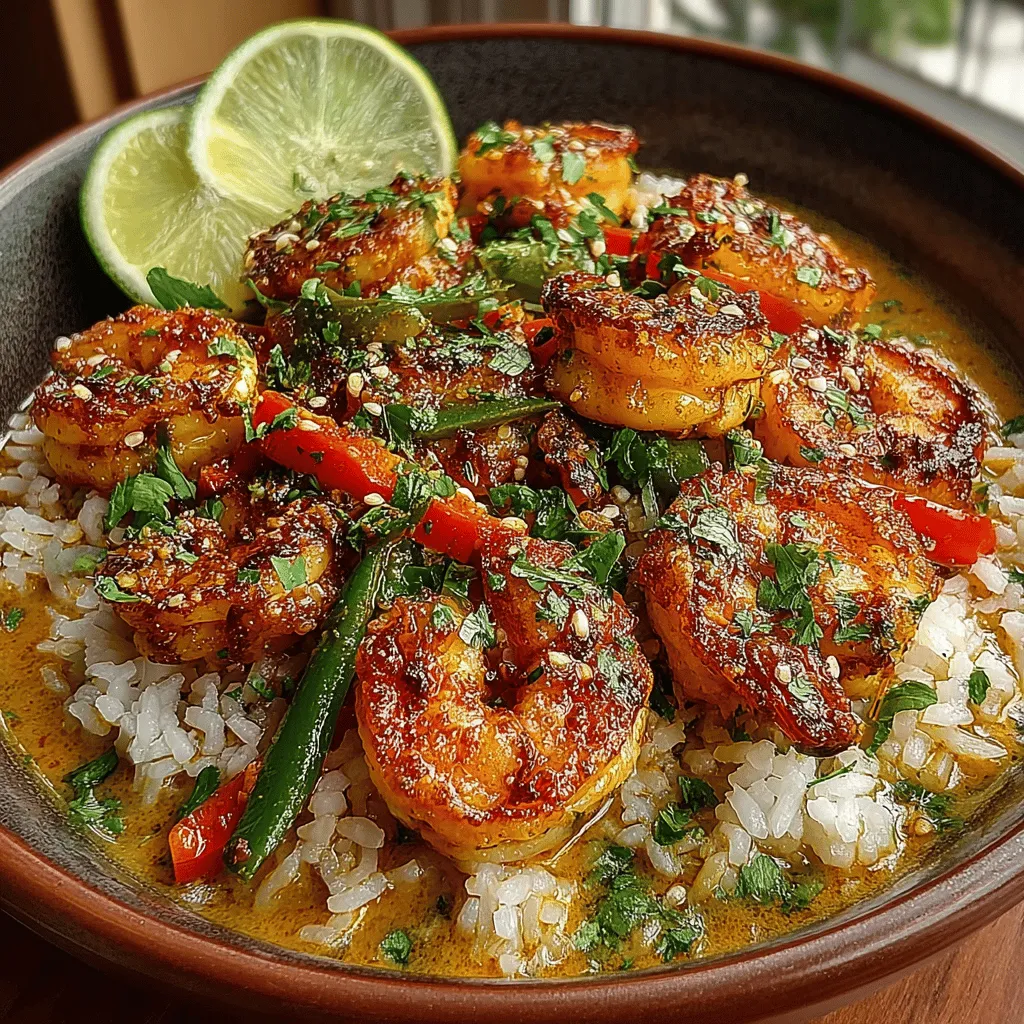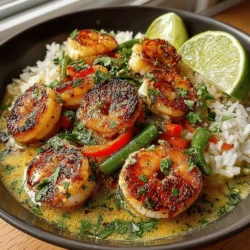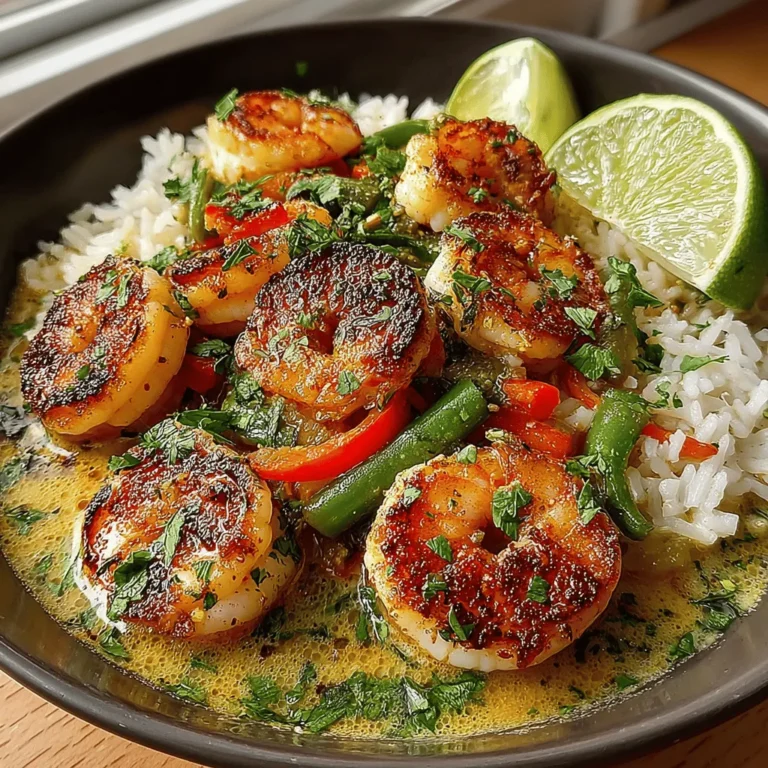Tropical Delight: Quick Coconut Curry Shrimp with Jasmine Rice
When you think of a dish that embodies the essence of tropical flavors and culinary simplicity, look no further than Tropical Delight: Quick Coconut Curry Shrimp with Jasmine Rice. This vibrant recipe is a burst of taste, combining succulent shrimp with the rich, creamy texture of coconut milk and the aromatic warmth of red curry paste. It’s a dish that not only tantalizes the taste buds but also transports you to a tropical paradise with every bite.
In today’s fast-paced world, the demand for quick and healthy meal options has skyrocketed. Many people are looking for recipes that are not only easy to prepare but also nutritious and satisfying. Tropical Delight fits the bill perfectly, offering a delightful balance of protein, healthy fats, and fresh vegetables, all in a meal that can be whipped up in under 30 minutes. Whether you’re a busy professional, a parent juggling multiple schedules, or simply someone who values convenience without compromising on flavor, this dish is designed with you in mind.
Understanding the Ingredients
To create this delightful dish, it’s essential to understand the key ingredients that contribute to its unique flavor profile and nutritional benefits.
Shrimp: As the star of the recipe, shrimp is not only delicious but also a fantastic source of lean protein. With minimal fat and calories, shrimp is rich in essential nutrients such as iodine, selenium, and vitamin B12. Its mild flavor and quick cooking time make it an ideal choice for a speedy meal.
Coconut Milk: This creamy liquid is derived from the grated pulp of mature coconuts. It adds a luscious texture to the curry while providing healthy fats that can enhance heart health. Coconut milk is also a great dairy alternative for those with lactose intolerance. Its subtle sweetness complements the spices in the curry, creating a well-rounded flavor.
Red Curry Paste: The heart of this dish lies in the red curry paste, a blend of red chili peppers, garlic, lemongrass, and other spices. This ingredient is crucial for imparting authentic Thai flavors. The heat from the chili peppers is balanced by the creaminess of the coconut milk, resulting in a rich and aromatic sauce that envelops the shrimp and vegetables.
Fresh Vegetables: Incorporating fresh vegetables like bell peppers and snap peas not only enhances the dish’s visual appeal but also boosts its nutritional value. Bell peppers provide a sweet crunch and are loaded with vitamins A and C, while snap peas add a fresh, crisp texture. These ingredients contribute to the overall health benefits of the dish and make it a colorful feast for the eyes.
Jasmine Rice: This fragrant rice variety is the perfect base for the coconut curry shrimp. Known for its slightly sticky texture and floral aroma, jasmine rice complements the richness of the curry. It absorbs the curry sauce beautifully, ensuring that every bite is packed with flavor. Additionally, jasmine rice is a good source of carbohydrates, providing the energy needed to fuel your day.
Cooking Preparation
Before diving into the cooking process, it’s important to prepare your ingredients properly. Start by cleaning and preparing the shrimp, as this is a crucial step in ensuring a delicious result.
1. Cleaning Shrimp: Begin by rinsing the shrimp under cold water. If you are using frozen shrimp, be sure to thaw them in advance. Once thawed, remove the shells and tails if necessary. For a cleaner taste and texture, devein the shrimp by making a shallow cut along the back and removing the dark vein.
2. Selecting Fresh Ingredients: When shopping for ingredients, opt for fresh shrimp that are firm and have a mild, ocean-like scent. Look for vibrant bell peppers and crisp snap peas, as these will enhance both the flavor and presentation of your dish.
3. Mise en Place: This French culinary term means “everything in its place.” Before you start cooking, gather and prep all your ingredients. Chop the vegetables, measure out the coconut milk and curry paste, and have everything ready to go. This not only streamlines the cooking process but also minimizes stress in the kitchen.
Step-by-Step Cooking Instructions
Now that your ingredients are prepped and ready, it’s time to cook! Here’s a detailed breakdown of each step to guide you through the process of creating this delicious Tropical Delight.
1. Cooking the Jasmine Rice: To ensure perfectly fluffy jasmine rice, start by rinsing 1 cup of jasmine rice under cold water until the water runs clear. This removes excess starch and prevents the rice from becoming gummy. In a medium saucepan, combine the rinsed rice with 1.5 cups of water and a pinch of salt. Bring the mixture to a boil over high heat, then reduce the heat to low, cover, and let it simmer for about 15 minutes. Once the water has been absorbed and the rice is tender, fluff it with a fork and set it aside.
2. Making the Coconut Curry Sauce: In a large skillet or wok, heat a tablespoon of oil over medium heat. Add the red curry paste and sauté for about 1-2 minutes, allowing the flavors to bloom. Be careful not to burn the paste; you want it to be fragrant but not browned.
3. Adding Coconut Milk: Slowly pour in one can of coconut milk, stirring to combine it with the curry paste. Bring the mixture to a gentle simmer, allowing it to thicken slightly. This is where the magic happens—the creamy coconut milk melds with the spices to create a luscious sauce.
4. Cooking the Shrimp and Vegetables: Add the cleaned shrimp to the skillet, followed by your chopped bell peppers and snap peas. Stir everything together, ensuring the shrimp is well-coated in the sauce. Cook for about 5-7 minutes, or until the shrimp turn pink and opaque. The vegetables should remain crisp, adding a delightful texture to the dish.
With these steps, you’ve laid the foundation for a vibrant and nutritious meal. Each ingredient plays a vital role in creating a balanced dish that is as appealing to the eyes as it is to the palate. In the next part of this article, we will explore additional tips for serving and enjoying this tropical delight, as well as variations to make it your own. Stay tuned for more delicious insights!

Creating the Coconut Curry Base: Tips for Balancing Flavors
The foundation of our coconut curry shrimp lies in crafting the perfect curry base. This is where the magic happens, and balancing the flavors is crucial for a delicious dish. Start with a good quality coconut milk; it should be creamy and rich, as it serves as the backbone of the sauce.
Tips for Balancing Flavors
1. Start with Aromatics: Begin by sautéing onions, garlic, and ginger in a tablespoon of oil until fragrant. This will create a flavorful base that enhances the overall dish.
2. Use Curry Paste Wisely: Depending on your spice tolerance, add red or green curry paste gradually. Start with a tablespoon and adjust to taste. The paste contains a variety of spices that will deepen the flavor profile.
3. Incorporate Broth for Depth: Adding a low-sodium vegetable or chicken broth will enhance the curry while ensuring it doesn’t become too rich. The broth helps to balance the creaminess of the coconut milk.
4. Sweetness and Acidity: To balance the heat from the curry paste, consider adding a teaspoon of sugar or honey. This sweetness counteracts the spiciness. Additionally, a splash of lime juice right before serving brightens the dish and adds a refreshing zing.
5. Taste as You Go: Always taste your curry base before adding the shrimp. This is your chance to adjust the seasoning and balance the flavors to your preference.
Techniques for Cooking Shrimp to Ensure Tenderness
Shrimp can easily become overcooked, resulting in a rubbery texture. To avoid this, follow these simple techniques:
1. Choose the Right Shrimp: Opt for fresh or frozen shrimp that are deveined and peeled. Large shrimp (16-20 count) offer a satisfying bite.
2. Marinate for Flavor: Before cooking, marinate the shrimp in a mixture of lime juice, salt, and a pinch of curry powder for about 15 minutes. This not only enhances flavor but also helps tenderize the shrimp.
3. Cook Quickly: When adding the shrimp to the coconut curry base, ensure the heat is medium-high. Shrimp cook quickly, usually within 3-5 minutes. Watch for them to turn opaque and curl slightly; this indicates they are done.
4. Remove from Heat Promptly: As soon as the shrimp are cooked, remove the pan from the heat to prevent continued cooking. This step is vital for achieving that tender, succulent texture.
How to Incorporate Vegetables for the Best Texture and Flavor
Adding vegetables to your coconut curry not only enhances the nutritional value but also adds vibrant colors and textures. Here’s how to do it effectively:
1. Choose Colorful Vegetables: Bell peppers, snap peas, and zucchini are excellent choices. They not only contribute a pop of color but also bring different textures to the dish.
2. Timing is Key: Add firmer vegetables like bell peppers and carrots a few minutes before adding the shrimp, so they have time to soften. Softer vegetables like zucchini or spinach can be added just before serving.
3. Sauté Before Adding to Curry: Lightly sauté the vegetables in the pan before introducing them to the curry base. This helps to intensify their flavors and ensures they are cooked evenly.
Flavor Profile Exploration
Understanding the flavor profile of your coconut curry shrimp is essential for creating a well-rounded dish that delights the palate.
Discussion of the Flavor Profile of the Dish
The flavor profile of this dish is a harmonious blend of sweet, spicy, and savory elements. The coconut milk provides a creamy sweetness that balances the heat from the curry paste. The addition of lime juice and fresh cilantro at the end brightens the dish, adding layers of flavor.
Balancing Sweet, Spicy, and Savory Elements
In tropical cuisine, balancing these flavors is key. The natural sweetness of coconut milk and shrimp counters the spiciness of the curry, creating a satisfying experience. Experiment with the proportions of each element to find your perfect balance.
The Role of Lime Juice and Cilantro in Enhancing Freshness
Lime juice is a crucial ingredient that not only adds acidity but also enhances the overall flavor. Fresh cilantro adds an aromatic touch that elevates the dish. Adding these ingredients just before serving ensures their flavors remain vibrant and fresh.
How the Dish Reflects Tropical Cuisine Influences
This coconut curry shrimp embodies the essence of tropical cuisine, reflecting influences from Southeast Asia and the Caribbean. The use of coconut milk, fresh herbs, and bright citrus notes are hallmarks of dishes from these regions, bringing a taste of the tropics to your table.
Presentation and Serving Suggestions
A well-presented dish not only appeals to the eyes but also enhances the dining experience. Here are some ideas for serving your coconut curry shrimp:
Ideas for Plating the Dish for an Appealing Presentation
1. Layering: Start with a bed of fluffy jasmine rice, then spoon the coconut curry shrimp over the top, allowing the sauce to cascade down the rice.
2. Color Contrast: Use brightly colored vegetables to contrast with the creamy curry sauce. This visual appeal can make a simple meal feel gourmet.
3. Use a Shallow Bowl: Serve in a shallow bowl to emphasize the layers of rice and shrimp, creating an inviting presentation.
Suggestions for Garnishing with Fresh Herbs and Lime Wedges
Finish your dish with a sprinkle of fresh cilantro and lime wedges on the side. The cilantro adds a fresh aroma, while the lime wedges encourage guests to add a burst of acidity to their taste.
Pairing Recommendations: Suitable Beverages or Side Dishes
Pair your coconut curry shrimp with a refreshing beverage. A chilled white wine, such as Sauvignon Blanc, complements the dish beautifully. For non-alcoholic options, try a coconut water or a tropical fruit-infused iced tea.
Nutritional Information
Understanding the nutritional content of your meal is vital, especially when you’re aiming for a balanced diet.
Breakdown of Calories and Macronutrients per Serving
A typical serving of coconut curry shrimp with jasmine rice contains approximately:
– Calories: 450
– Protein: 25g
– Carbohydrates: 50g
– Fat: 15g
These values may vary based on ingredient choices and portion sizes.
Health Benefits of the Ingredients Used
1. Shrimp: A great source of lean protein and low in calories, shrimp is rich in selenium and vitamin B12.
2. Coconut Milk: Provides healthy fats and is a good source of manganese and copper, supporting metabolism and immune function.
3. Vegetables: Adding a variety of vegetables increases fiber content, vitamins, and minerals, contributing to overall health.
How This Dish Fits into a Balanced Diet
This coconut curry shrimp recipe can fit well into a balanced diet, providing protein, healthy fats, and fiber. To make it even more nutritious, consider serving it with a side salad or steamed vegetables.
Conclusion
In conclusion, this Quick Coconut Curry Shrimp with Jasmine Rice is a vibrant dish that brings the flavors of the tropics into your home kitchen. With its balanced mix of sweet, spicy, and savory elements, this recipe is not only delicious but also quick and easy to prepare.
Encourage your family and friends to join in the cooking process, making it a fun and engaging experience. The joy of cooking is not just in the final dish but in the love and creativity you put into it. So, roll up your sleeves, gather your ingredients, and bring a taste of the tropics to your table. You’ll not only nourish your body but also indulge your soul with every delicious bite.

